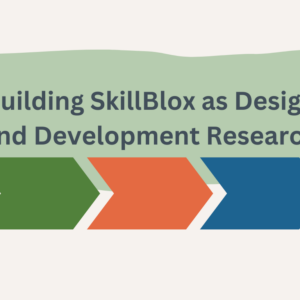
By 21CLEO Research Team
In a previous blog post, we identified how the small, supportive efforts of immediate supervisors made a real difference in how working learners developed successfully as both workers and learners. In this post, we share the story of one of our participants who had the opposite experience. Hers is the story of how decisions made at the corporate level and a toxic work environment stymied her career despite her best efforts to engage in multiple job related learning opportunities.
Destiny, an African American woman, had worked at a small (167 room) resort run by a large hotel chain. She started on the front desk, became a front desk supervisor, and without a promotion or raise eventually took on the responsibilities of an associate manager. Ultimately, once she took on the duties, the position was eliminated.
We interviewed Destiny three times over the course of two years. These three interviews gave us an idea of Destiny’s learning and career trajectory, but most importantly allowed us to build trust with Destiny. By the third interview, she opened up to us about her work and learning experience in ways that showed us how even the hardest working person’s efforts can be undermined.
Destiny described herself as someone who was committed to learning and growth. When we first interviewed her, she described how she had taken advantage of LinkedIn learning opportunities made available by the local workforce development center and promoted by human resources at her hotel. She had also been taking classes in hospitality at the local community college three days a week after work in addition to taking online courses offered by her employer. She took these courses to meet both long and short-term learning goals:
The reason was just to help build my team and make us more cohesive. And that was the reason why I engaged in the classes. My long term goals were to continue in my field and that is in customer service, and especially in hospitality. I would like to continue doing so in that field, I feel like that’s something that is close to my skill set.
She was enthused about the LinkedIn courses because they offered topics not available at the community college. These were more engaging than those offered through her employer, and because they met her immediate need. As she noted, the online learning helped her immediately because,
“I felt like I needed more…. I was going to school at the time, and I was like, I can’t juggle school and take on this [associate manager] responsibility at the same time. So this is like perfect for me to be able to take these classes because I can take them on company time and because it’s something that I’m using to enhance the company and my team and it wasn’t like it was something like my own personal goals that I was doing, it was something that they consider to be for the company.”
Destiny was committed to the company so much so that she bought stock. She worked hard to ensure the resort she worked at had high ratings, and even though she was still an hourly employee, she would answer calls when she was off the clock. She saw a future for herself in the hospitality industry. She said,
“Well, in a year, hopefully, I’ll have everything down by then and maybe branch out because since the company restructured, they’ve eliminated a lot of positions. So there’s no AGM [assistant general manager] position, especially the ones here in [her state]….but I know a lot of them are mostly out of state.
I don’t know if I necessarily want to move out of state, but I do know that with the skills that I’m picking up now that I would be able to — there are other companies that haven’t eliminated those positions and I will be able to step in somewhere there, somewhere.”
Destiny seemed on track for success. She had been taking advantage of multiple learning opportunities, human resources was aware of her participation, and she had a supportive manager who allowed her to use on-the-clock time to take courses or to stay after her hours were over and use the office computer. Other staff members and managers encouraged her to apply for a promotion even though she felt she didn’t have the skills yet or see it in herself. She said,
“When I started [I was] level one. Then I started learning the position and the software and the things that were necessary for my position. I was already taking classes, business classes and started improving upon some of my verbiage and some of the business verbiage. I don’t know, I guess, they saw something in me. And then I [was promoted] to supervisor. And then from there, I only worked for the company, less than two years or so, and I went from there to guest services manager. I just started to learn my position. I started to just put my all into it and the things that I saw that I was lacking in either took a class or I asked questions. [I saw] that I love to learn things, so I think that was a positive and helped them decide, because I wasn’t the only candidate that was going for the position. So you know I feel very proud of myself that I was able to. I was able to get the position and they saw something in me that you know and they put enough trust in me to know that I would be able to handle the position.”
She said the assistant general manager (whom we call Bob), told her,
“I know you can do it. I see something in you that you may not even see in yourself. But I know you can do it. He said, you always promote somebody with something that you see in yourself, that you will feel honored to replace you.”
When we interviewed her a year later, midway through the Covid-19 pandemic, things had changed dramatically. Destiny was unemployed, and she told us she was getting discouraged because despite her best efforts, she was not getting offered jobs. She said,
“Sometimes you take the classes that are necessary to get an advancement in your career, but [you are] not given the opportunity. Sometimes it might be because someone else is feeling that you’re just not ready and they’re not really knowing all that what you have to give to that particular position. They’re only seeing one side of things. Maybe they’re looking for someone else, or sometimes people just don’t give you an opportunity to show who you are and what you have to offer. It can be discouraging but I guess if you’re persistent you can make it and you’ll be given an opportunity, maybe not in the particular company where you are, but maybe somewhere else.”
When we interviewed her a third time, she was still unemployed. She had just finished some classes on customer service and team building through Goodwill and was trying to decide what direction she wanted to go in her career. Despite trying to present a positive impression, she eventually revealed that she was feeling burned out. She felt at a disadvantage because even though she had a great deal of experience, she did not have a degree. Eventually, Destiny revealed the complexities of her workplace that lead to her being fired and the burn-out she was experiencing.
The first issue was that the company eliminated the position of associate manager. This position was an essential first step for her to transition from an hourly supervisory position to a salaried management position. Second was the loss of Bob, the assistant general manager who had championed Destiny. When Bob left, Destiny was left working with Chad, a general manager who was not supportive. She said,
“It was a big transition and I did struggle at first, but the thing is the general manager at the time, I don’t think that he had the confidence in me. Because Bob told me the general manager spoke with him. Chad said, I don’t know if she’s ready. And Bob said I think she is. I’m going to give her a chance because I see something. He said I worked with her every day closely. Maybe that’s the difference between what I see in her and what you don’t. So I’m going to take that chance. When Bob’s position got eliminated, Chad didn’t have quite that confidence in me. So that made a difference in how I worked. With Chad, I felt discouraged and like a burden, you know, not an asset.”
When asked about what might have been the cause of Chad’s lack of faith in her, Destiny acknowledged that bias might have played a role. She said,
“I think I had a lot of things, a lot of strikes per se that were against me. I’m black. I’m female and I was overweight. So, I think all those things had something to do with how he felt about me.”
She also shared that Chad had been making sexual advances toward another employee, and Destiny had been the one to put in a complaint against him. When Destiny asked for a raise because of her increased workload, and because others in the hotel had received a raise and she did not, Chad responded by threatening to demote her.
Destiny tried to get transferred to another resort where she was known to be a valued worker. She said,
“I went to other resorts, and they gave great reviews on me…. They brought me [in] for a little while because they had a position that needed to be filled, and we had extra agents, so I can go to another resort and help them out. They had a position in [location] where they just opened a resort or the resort was doing so bad. They asked me. They asked Chad if I could go, and he told [them] I wasn’t ready.”
Destiny was eventually fired after her boyfriend had shown up at the resort in a disheveled state and she refused a drug-test. Because of the conditions of her termination, Destiny was not eligible for unemployment, so she filed an unlawful termination charge against the company and the case was settled. The last time we spoke, Destiny had not yet found work and was unsure of what she was going to do.
Destiny’s experience illustrates how the different pieces of a learning ecosystem need to work together in order for a working learner to advance. Although Destiny took advantage of every learning opportunity she could, worked hard, and had a manager (Bob) who encouraged her and taught her aspects of his job, she was unable to advance and even lost her position because of other forces. The company eliminated a clear and achievable upward path for her, she lost the manager who had been her advocate, the Covid-19 pandemic put unprecedented pressure on the hospitality industry, and her general manager (Chad) stood in her way by preventing her from transferring to another facility, by denying her a raise, and by manufacturing a reason for terminating her.
The evidence from Destiny shows that without a career ladder, racial and gender bias, and a hostile work environment, even best efforts can be unrewarded. We hope that Destiny regains her enthusiasm for learning and working and with the recovering economy is able to build a rewarding career.




